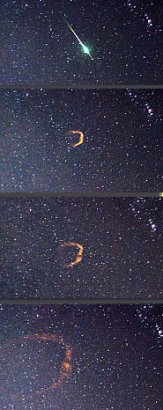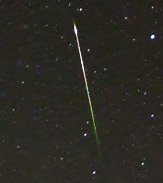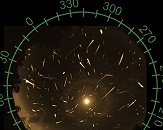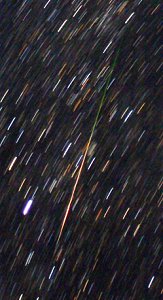| |
| |
Photographer,
Location |
Images |
Comments |

|
Marsha
Adams,
Sedona AZ, looking SE over the Sedona Airport.
Orion is in the pictures.
Oct. 21, 2008 |
#1, #2, #3 |
Time
lapse camera taking pictures at one minute intervals
captured a bolide from the Orionids meteor shower.
The bolide explosion evidently left a bubble
of glowing debris that expanded for at least
15 minutes. The original picture is not processed
but the composite picture has been enhanced so
the glowing clouds are more visible. |

|
Martin
Mc Kenna,
Maghera, Co. Derry, N. Ireland
Oct. 22, 2008 |
#1, #2, more |
Tonight
I was very impressed by the activity of the Orionid
meteor shower despite maximum activity taking
place the morning before. I observed a stunning
Orionid pierce through Auriga so I set up my
camera and took a patrol image. This beauty shot
through the field!. It was magnitude 0 and left
a wonderful blue and green ion train in its wake
for 3 seconds. The meteor itself was multicoloured
with a 'diamond' head. That's two bright Orionids
in the same constellation in less than 1 min!.
Fujifilm S6500fd 6.3MP ISO800 30 sec's F/2.8
28mm lens. |

|
Chris
Peterson,
Guffey, Colorado, USA
Oct. 21, 2008 |
#1, more |
This
is a composite image of 228 meteors made with
a video allsky camera. The meteors were recorded
between October 18 and October 21. The Moon has
been removed from the composite, although a single
frame has been retained showing a beautiful lunar
halo. |

|
Stephen
O'Meara,
Volcano, Hawaii, USA
Oct. 21, 2008 |
#1 |
Despite
the last-quarter Moon on October 21st, the Orionid
meteor shower put on a good show over Hawaii.
Between 2:30 am and 3:30 am Hawaiian standard
time, I counted 20 meteors. They ranged from
magnitiudes –1 to 4th. Many were colorful
(yellows and blues), and the activity came in
waves. The most memorable moment was when six
swift meteors burst into view in six seconds!
Very nice. |
more
images: from
Jim Tegerdine of Marysville, Washington, USA
|
|